The front porch is often the first impression guests have of your property, offering a welcoming space that reflects your personal style. As visitor move from the porch to the parking area, the choice of flooring becomes crucial. While there are many options available for outdoor surfaces, only a select few can seamlessly transition from exterior to interior, ensuring both aesthetic harmony and durability. Granite is one such option, known for its ability to stand the test of time and provide a unified, appealing look throughout your home’s entrance.
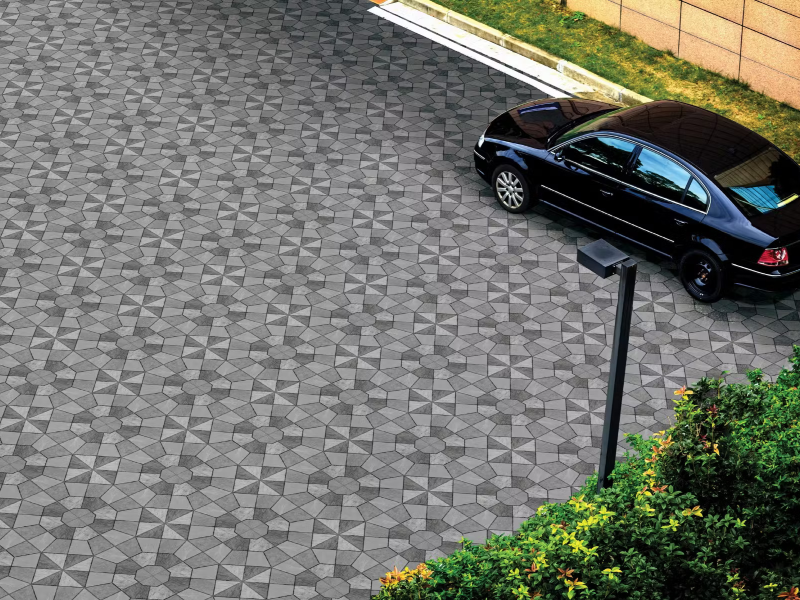
The minimum requirement for parking flooring when it comes to accommodating vehicle wheels is to ensure that the flooring material is durable enough to withstand the weight and pressure exerted by the vehicle. This means choosing a material that is strong and resistant to cracking or breaking under the load of the vehicle. Additionally, the flooring should provide sufficient traction to prevent slippage, especially when the surface is wet or oily, to ensure safe movement of the vehicle. Proper installation and maintenance of the flooring are also essential to ensure its longevity and performance under vehicle traffic.
One such popular material used in pakring flooring is granite tiles due to their durability, low maintenance, and versatility. This blog will explore the benefits of using granite tiles for both your front porch and parking flooring, as well as consider other viable alternatives.
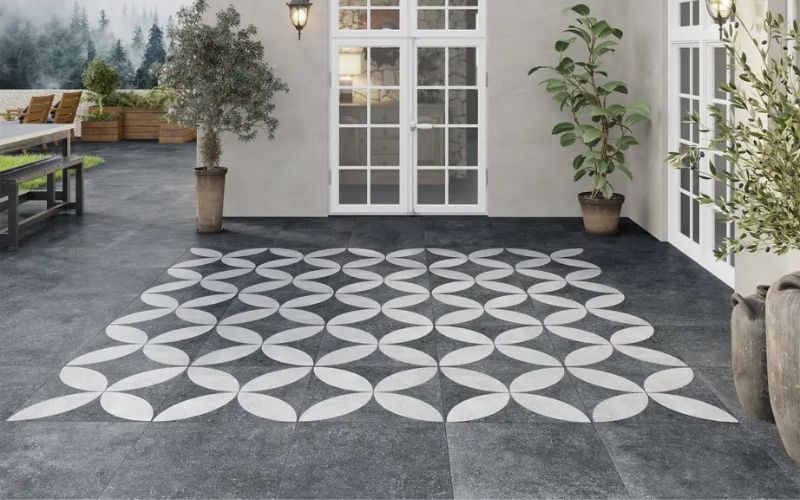
What are some benefits of using granite for parking floors and front porches?
- Weather Resistance: Granite is highly resistant to weathering, making it suitable for outdoor applications. It can withstand exposure to sunlight, rain, snow, and fluctuating temperatures without deteriorating or fading.
- Safety: Granite’s natural texture and anti-skid finishes provide excellent traction, reducing the risk of slips and falls, especially in outdoor areas where surfaces may become wet or slippery.
- Durability: Granite is a highly durable natural stone that can withstand heavy foot traffic and vehicle weight without easily cracking or chipping. This makes it ideal for areas like parking floors and front porches that experience frequent use.
- Low Maintenance: Granite is relatively low maintenance compared to other materials. It is resistant to stains, scratches, and wear, requiring minimal cleaning and upkeep.
- Aesthetic Appeal: Granite offers a luxurious and elegant appearance, enhancing the visual appeal of parking floors and front. It comes in a variety of colours and patterns, allowing for customisation to match different architectural styles and preferences.
- Longevity: Granite is known for its longevity, with a lifespan that can span decades or even centuries with proper care. Choosing granite for parking floors and front porches can provide long-term benefits in terms of durability and longevity.
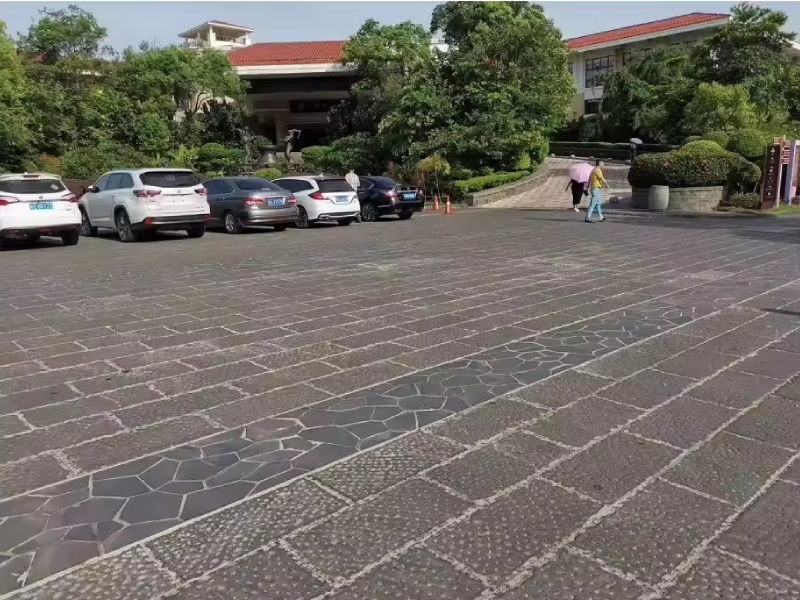
Choosing Anti Skid Finishes of Granite Tiles for Parking Flooring
Safety is a major concern, especially for outdoor areas like parking floors and front porches where there is a risk of slipping, especially when wet. Granite can address this concern by offering multiple anti-skid finishes.
Granite can be finished in various ways to enhance its slip resistance, including:
- Flamed Finish Granite: This finish involves exposing the surface of the granite to high temperatures and then rapidly cooling it, creating a rough texture that improves traction.
- Bush Hammered Finish Granite: In this finish, the surface of the granite is textured using a specialized tool called a bush hammer, which creates a rough, pitted surface that enhances grip.
- Sandblasted Finish Granite: Sandblasting involves using compressed air or water to spray abrasive materials onto the surface of the granite, creating a textured surface that improves slip resistance.
- Honed Finish Granite: While not as rough as the previous finishes, honed granite still provides better traction than polished granite due to its smoother but matte surface.
- Leathered Finish Granite: Leathering creates a textured, slightly rough surface, enhancing traction. It offers high anti-slip properties, suitable for areas with heavy foot traffic.
These anti-skid finishes can significantly reduce the risk of slipping, especially in outdoor areas where surfaces may become wet or slippery due to rain, snow, or other environmental factors. By enhancing safety, granite becomes an even more attractive option for outdoor paving applications like parking floors and front porches.
READ | How to Enhance Safety with Anti-Skid Granite Stairs: Effective Methods and FAQs
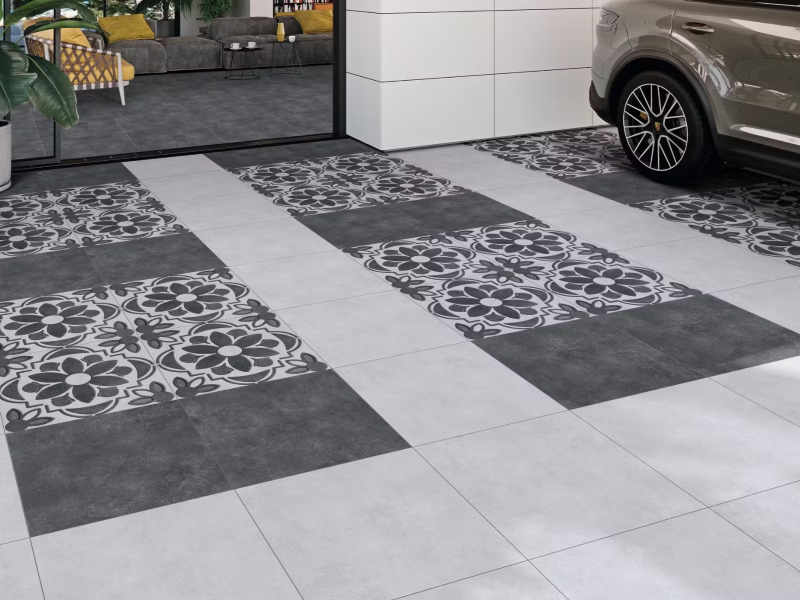
What factors should be considered when selecting flooring for parking areas?
When selecting flooring for parking areas, careful consideration of several key factors is essential to ensure optimal performance, safety, and longevity.
Below are the factors to be consider when selecting flooring for parking areas
Traffic Load and Wear Resistance: Assess the anticipated volume and weight of vehicles to ensure the flooring material can withstand heavy loads without cracking or deteriorating over time.
Safety and Slip Resistance: Prioritize flooring materials with adequate traction to minimize the risk of slips and falls, especially in areas prone to wet or slippery conditions.
Climate and Weather Resistance: Consider the local climate and weather conditions to choose a flooring material that is resistant to temperature fluctuations, moisture, and UV exposure, ensuring long-term durability.
Maintenance Requirements: Evaluate the level of maintenance required to keep the flooring clean and well-maintained, including considerations for regular cleaning, sealing, and repairs.
Aesthetic Considerations: Select a flooring material that complements the overall design and aesthetic of the parking area, taking into account factors such as color, texture, and pattern options.
Cost and Budget Constraints: Balance the upfront cost of the flooring material with its long-term durability and maintenance requirements, considering the total cost of ownership over the lifespan of the flooring.
Installation Requirements: Take into account any specialized installation techniques, subfloor preparations, or additional labor costs associated with the chosen flooring material, ensuring compatibility with the project timeline and budget.
By considering these factors comprehensively, you can make an informed decision when selecting flooring for parking areas that meets your specific requirements and priorities.
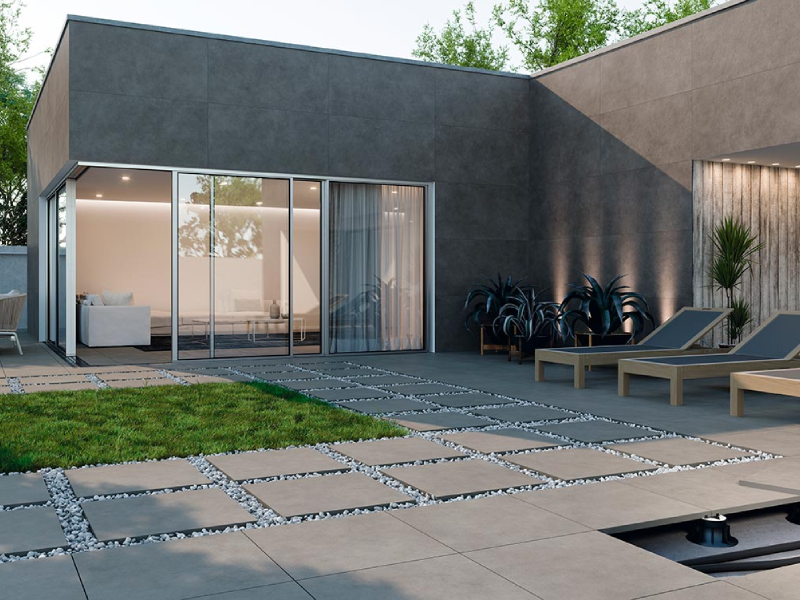
Other Alternatives for Outdoor Flooring
Concrete Pavers
- Pros: Affordable, durable, and available in various shapes and colours. Suitable for withstanding the weight and movement of vehicles.
- Cons: Can crack over time due to heavy vehicle traffic and may require regular sealing to maintain durability, especially in areas with extreme temperature fluctuations.
Brick
- Pros: Offers a classic look, durability, and slip resistance, making it suitable for vehicle movement.
- Cons: More expensive than some options, and requires maintenance to prevent moss and algae growth, particularly in regions with high humidity or precipitation.
Porcelain Tiles
- Pros: Highly durable and resistant to moisture, making them suitable for outdoor use. Available in numerous designs to complement various styles.
- Cons: Can be slippery when wet, posing a risk for vehicle movement, especially during rainfall. Also, they tend to be more expensive than some alternatives.
Natural Stone (Slate, Limestone)
- Pros: Offers a unique natural look, durability, and non-slip surfaces, making them suitable for outdoor areas with vehicle traffic.
- Cons: Can be costly upfront, and may require sealing to maintain durability, particularly in regions with frequent temperature fluctuations.
READ | Outdoor Flooring: Natural Stone Options
Composite Decking
- Pros: Low maintenance and weather-resistant, suitable for withstanding outdoor conditions and vehicle movement.
- Cons: Can be more expensive than some alternatives and may not have the same natural look as stone or brick, but still offers durability and longevity for outdoor applications with vehicle traffic.
Cobblestone
- Pros: Cobblestones offer a classic and rustic look, adding charm to outdoor spaces. They are durable and can withstand heavy vehicle traffic, making them suitable for driveways and parking areas. The irregular surface texture of cobblestones provides natural traction, reducing the risk of slipping, even in wet conditions.
- Cons: Installation of cobblestones can be labour-intensive and time-consuming, potentially increasing initial costs. The irregular surface may not be as smooth for driving as other alternatives, and the joints between cobblestones may require periodic maintenance to prevent weeds from growing.
ALSO READ |
Granite Cobblestones for Driveways: Why They’re the Best Choice









